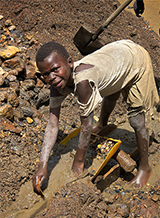
Thousands of children are being exploited in the mines and by armed groups that operate in the Tanganyika district of Katanga province in the Democratic Republic of the Congo. June 16 marked International Day of the African Child, and local activists publicly called on the authorities to secure the safety of these children.
Speaking to Radio Okapi, Fatuma Kamona, chief of the Gender, Family and Child service in Tanganyika, stated alarming statistics:
“There are more than two thousand children in the ranks of armed groups…Sadly, we also see cases of rape and sexual violence against the young girls. This violent impunity must stop. The majority of these girls working in the mines are minors who become pregnant before coming of age.”
Unfortunately, these figures are all too true for many parts of eastern Congo. In May, World Vision released a report entitled “Child Miners Speak.” The report interviews child miners, their parents, and other community members in Katanga Province in an effort to hear first-hand testimonies of the turbulent lives of the children who are forced to work in Artisanal Mines throughout eastern Congo. Of the 50 children interviewed,
- 19% of the children said they had seen a child die on an artisanal mining site,
- 87% experienced body pain and many had been injured,
- 67% of the children experienced frequent or persistent coughing, and
- Several girls reported experiencing genital infections after working waist-deep in acidic water.
Children in the Congo have also been conscripted into various armed groups since the earliest days of the conflict over a decade ago. According to Humans Rights Watch,or HRW, the U.N. has estimated that more than 30,000 children were fighting in the Congo with various armed groups. HRW’s 2010 report, “Trail of Death” deals with LRA incursions into northeastern Congo and looks at their practice of kidnapping children to brutally train them to become child soldiers.
To combat this practices,Fatuma Kamona is calling on both the local and international community for help:
“We don’t have the means. But the government, the agencies of the United Nations, the local community itself, the parents and the children themselves; we must all get involved. The will is there. We must succeed in ending these atrocities.”
On June 17, the U.N. Security Council will hold a debate on children and armed conflict to discuss the Secretary-General’s recent report on children and armed conflict.
Photo: Child miner in eastern Congo (Sasha Lezhnev/Enough Project)

